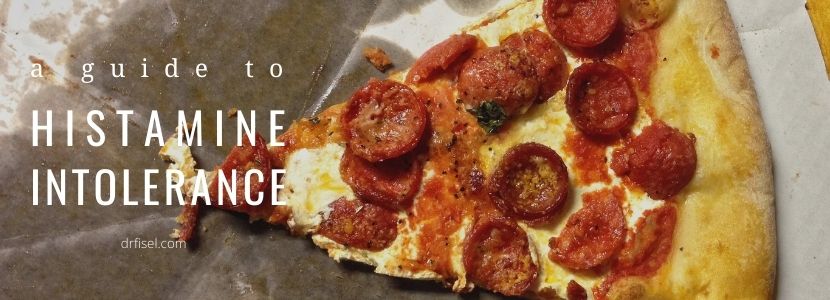
Last night you let the babysitter order pizza for the kids.
For some crazy reason there’s one slice of pepperoni left in the box on the counter.
Thinking back to those college days…
Why does leftover pizza seem like a good idea first thing in the morning?
As tempting as it sounds, food left out on the counter overnight can wreak havoc on your body.
It’s called…
HISTAMINE INTOLERANCE.
Most people are born with an amazing defense mechanism to protect their body from the outside world. One of the built-in ways the body fights off invaders is to utilize histamines (found in food) that carry away allergens and other irritants from our eyes, noses and skin for instance.
Histamines found in foods can be:
- NATURAL – Histamines are naturally found in fermented foods, meat, shellfish, alcohol, tomatoes, avocado, spinach, and nuts among others.
- LIBERATED – Some foods interact with the body to liberate histamines, such as: chocolate, alcohol, bananas, strawberries, nuts, and citrus.
- DEVELOPED –Histamines multiply in food that is “left over” and not properly disposed of or frozen after preparation. This is your warning to avoid that last piece of pizza and leftovers in general!
Sometimes we over consume, or our bodies over produce, histamines. We develop an intolerance to histamines when we cannot break them down efficiently. Histamines can become too much for our system to handle and we start to notice certain symptoms that are different from seasonal allergies; persistent. Over the long term, they are indicative of histamine intolerance, and are systemic which can lead to larger problems.
Histamine intolerance might initially look like:
- Itchy skin and/ or hives
- Abdominal bloating
- Diarrhea
- Runny nose, nasal congestion, sneezing, red or itching eyes
- Fatigue
- Anxiety
- Headaches
An abundance of histamines might cause more systemic damage like:
- Ehlers-Danlos Syndrome (EDS)
- Irritable Bowel Syndrome (IBS)
- Inflammatory intestinal disorders
- Periodontal disease
- Postural Orthostatic Tachycardia Syndrome (POTS)
- Small Intestinal Bacterial Overgrowth (SIBO)
If you have been experiencing chronic immune responses that cannot be easily explained, Dr. Fisel can help you look into the root of your discomfort to alleviate your obvious symptoms and hopefully your overall histamine intolerance.
Initially, Dr. Fisel can analyze your unique situation using several assessment tools:
- Nutritional – We help tailor your nutritional habits to limit excess histamines
- Environmental – We can assess your environment and help you eliminate histamine stressors
- Lifestyle – Sleep and movement play a big part in your overall health – we can take a look at your patterns.
- Medications – We will help you assess what you are currently taking and advise you about interactions; we can recommend complimentary protocols to your existing regimen.
Dr. Fisel can help you find relief if you are battling with histamine intolerance. If you live in the Guilford/ Branford/ New Haven/ Madison/ Clinton area and would like to learn more about the innovative programs Dr. Fisel has to offer, call (203) 453-0122 or CLICK HERE to schedule your consultation.
RESOURCES:



